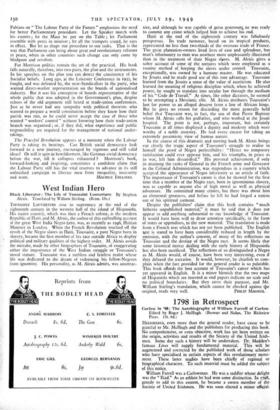West Indian Hero
Black Liberator : The Life of Toussaint Louverture. By Stephen Alexis. Translated by William Stirling. (Benn. 18s.)
Toussatsrr LOUVERTURE rose to supremacy at the end of the eighteenth century in the western half of the island of Hispaniola. His native country, which was then a French colony, is the modern Republic of Haiti, and M. Alexis, the author of this enthralling account of the great West India Negro hero, was, as recently as 1946, Haitian Minister in London. When the French Revolution touched off the revolt of the Negro slaves in Haiti, Toussaint, a pure Negro born in slavery, became the first member of his race outside Africa to display political and military qualities of the highest order. M. Alexis avoids the mistake, made by other biographers of Toussaint, of exaggerating either the importance of the West Indian struggle or Toussaint's moral stature. Toussaint was a ruthless and fearless zealot whose life was dedicated to the dream of redeeming his fellow-Negroes from ignominy. His personality, as M. Alexis admits, was unattrac-
live, and although he was capable of great generosity, he was ready to commit any crime which helped him to achieve his end.
Haiti at the end of the eighteenth century was fabulously prosperous. Its trade turnover, based on its tropical products, represented no less than two-thirds of the overseas trade of France. The great plantation-owners lived lives of ease and splendour, but man's inhumanity to man was nowhere more unpleasantly illustrated than in the treatment of their Negro slaves. M. Alexis gives a sober account of some of the tortures which were employed as a routine method of keeping the slaves under control. Toussaint, exceptionally, was owned by a humane master. He was educated by Jesuits and he made good use of this rare advantage. Toussaint learned from the Jesuits a sense of the value of asceticism. He also learned the meaning of religious discipline which, when he achieved power, he sought to translate into secular law through the medium of his "Code de Travail." At times, like other dictators, he seemed to be attempting a Messianic role. M. Alexis attributes Toussaint's lust for power to an alleged descent from a line of African kings. But he gives no reason for discarding the more generally held belief th it Toussaint was, in fact, the son of that Pierre Baptiste whom M. Alexis calls his godfather, and who worked at the Jesuit hospital. The point is not, perhaps, important, but certainly Toussaint at all times displayed 3 dignity and modesty which were worthy of a noble ancestry. He had every excuse for taking an extremely pessimistic view of human nature.
In the course of this dramatic and moving book M. Alexis brings out clearly the tragic aspect of Toussaint's struggle to realise in himself the proof of Negro perfectibility: "Hence no temporary satisfaction could ever appease him, and his triumphs, in peace as in war, left him dissatisfied." His personal achievement, if only in attaining the ranks of General in the French army and Governor in the Colonial Administration, was stupendous in a country which acceptal the appearance of Negro inferiority as an article of faith. The importance of Toussaint's career is that he showed for the first time that a member of the Negro race, born in ignominious slavery, was as capable as anyone else of high moral as well as physical adventure. He committed many crimes, but there was about him an elemental greatness, and before he fell he had forged a nation out of his spiritual torment.
Despite the publishers' claim that this book contains "much hitherto unpublished material," it must be said that it does not appear to add anything substantial to our knowledge of Toussaint. It would have been well to draw attention specifically, in the form of notes or appendixes, to the new material. The translation is made from a French text which has not yet been published. The English text is stated to have been considerably reduced in length by the omission, with the author's consent, of many of his reflections on Toussaint and the destiny of the Negro race. It seems likely that some historical matter dealing with the early history of Hispaniola has also been sacrificed. The reflections of so distinguished a Negro as M. Alexis would, of course, have been very interesting, even if they delayed the narrative. It would, however, be churlish to com- plain when the fare provided for the general reader is so palatable. This book affords the best account of Toussaint's career which has yet appeared in English. It is a minor blemish that the two maps of Hispaniola which arc inserted as end papers indicate no scale and no political boundaries. But they serve their purpose, and Mr. William Stirling's translation, which cannot be checked against tIte


































 Previous page
Previous page